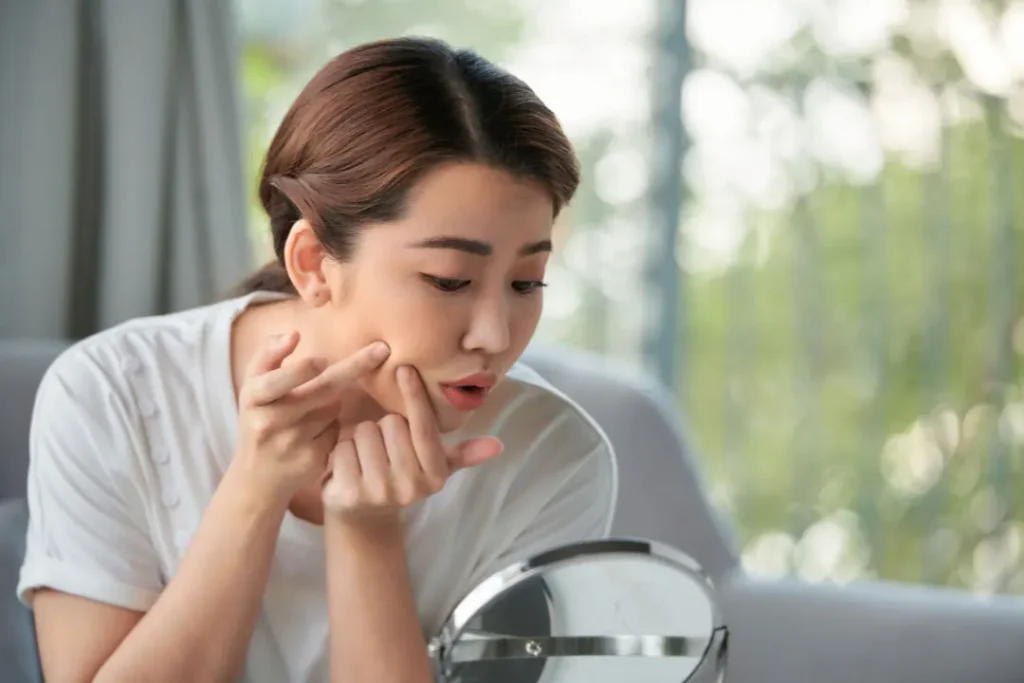Organic grapeseed oil is lightweight, non-comedogenic, anti-inflammatory, and versatile. It can be used as a massage, moisturizer, or bath oil. We’ll discuss five great benefits of organic grapeseed oil for skin and recommend one of the best brands on the market.
The skincare industry is booming like never before. With beauty gurus and celebrities showcasing their flawless skin and promoting the latest skincare fads, numerous brands and products are flooding the market to meet growing demand. Organic grapeseed oil is a natural ingredient in skincare products that is often overlooked, despite its nourishing and rejuvenating properties. Keep reading to learn more about this potent skincare ingredient and for a high-quality organic grapeseed oil skincare product recommendation.
You May Also Like:
How to Use Curd in Your Facial Skin Care Routine
Dermatologists Share Skin Care Tips for Menopause and Beyond
Organic grapeseed oil for skin is effective
Organic grapeseed oil is a versatile and effective natural ingredient for skincare. Extracted from the seeds of grapes, this oil is high in antioxidants, vitamins, and fatty acids that help to nourish and rejuvenate the skin. It is commonly used in facial oils, moisturizers, and serums to improve moisture retention, reduce inflammation, and protect against environmental stressors.
To identify a high-quality grapeseed oil product, look for organic ingredients and a lightweight texture. The best organic grapeseed oil for skin should be free from additives, preservatives, and harmful chemicals. Here’s a list of five great benefits offered by organic grapeseed oil for skin, from improving moisture retention to reducing the appearance of fine lines and wrinkles.

Organic grapeseed oil for skin benefit:
#1 Anti-aging
Organic grapeseed oil is an excellent natural ingredient for anti-aging skincare due to its high concentration of antioxidants, such as vitamin E and proanthocyanidins. These powerful antioxidants protect the skin from free radical damage caused by UV radiation, pollution, and other environmental stressors. Using organic grapeseed oil for skin also helps to improve skin elasticity and reduce the appearance of fine lines and wrinkles by promoting collagen production. Organic grapeseed oil has a lightweight texture that makes it easy for the skin to absorb, leaving it feeling soft and supple. Regular use of organic grapeseed oil for skin can help maintain a youthful and radiant complexion.

Organic grapeseed oil for skin benefit:
#2 Anti-inflammatory
The anti-inflammatory properties of organic grapeseed oil make it effective in soothing irritated or inflamed skin. Organic grapeseed oil contains polyphenols and flavonoids, which can reduce inflammation and redness and improve the skin’s overall health. Using organic grapeseed oil for skin can also help to repair damaged skin cells and prevent further damage by neutralizing free radicals. Its light texture makes it ideal for sensitive or acne-prone skin, as it won’t clog pores or cause further irritation.

Organic grapeseed oil for skin benefit:
#3 Brightening
High doses of vitamin E have been observed to help brighten and even out skin tone. Organic grapeseed oil is full of vitamin E, which helps to nourish the skin and protect it from damage caused by UV radiation and other environmental stressors. Organic grapeseed oil is also easily absorbed by the skin, allowing the vitamin E to penetrate deeply and provide lasting benefits. Over time, regular use of organic grapeseed oil for skin can help reduce the appearance of dark spots and hyperpigmentation, leaving the skin looking brighter and more radiant.
Organic grapeseed oil for skin benefit:
#4 Fights acne
Organic grapeseed oil is an excellent natural ingredient for fighting acne due to its antibacterial and anti-inflammatory properties. Using organic grapeseed oil for skin can help reduce sebum production and control acne-causing bacteria. Organic grapeseed oil also contains linoleic acid, which has been shown to reduce inflammation and promote healing in acne-prone skin. The use of organic grapeseed oil for skin can help to prevent breakouts, reduce the appearance of acne scars, and leave the skin feeling soft and smooth when used regularly.
Organic grapeseed oil for skin benefit:
#5 Moisturizing
Using organic grapeseed oil for skin helps to moisturize the skin without clogging pores due to its lightweight, non-greasy texture. It contains high amounts of linoleic acid, an essential fatty acid that helps to strengthen the skin barrier and retain moisture. Organic grapeseed oil also contains vitamin E to help nourish and protect the skin. Its light texture allows it to be easily absorbed by the skin, encouraging softness, smoothness, and hydration. Using organic grapeseed oil for skin can help you maintain a healthy and balanced moisture level, reducing dryness and flakiness.
Roe Wellness offers organic grapeseed oil in their Calming Baby Oil, making it a high-quality product for skin care. This gentle and nourishing oil is perfect for sensitive or delicate skin, helping to soothe irritation while providing long-lasting hydration. Calming Baby Oil also contains avocado and meadowfoam seed oil which encourage moisture retention, limit inflammation and irritation, and support anti-aging.
Founder of roe Wellness, Alexa Anglin, saw a need for a better and safer skincare product. “I took my experience as a pediatric nurse practitioner and first-time mother and channeled that into creating roe Wellness. I wanted to give parents worry-free products they felt good about putting on their kid’s skin and products to help mommas through their pregnancies.” While roe Wellness was created with kids in mind, their Calming Baby Oil is safe and effective for all ages.

Organic grapeseed oil for skin can benefit you
Organic grapeseed oil for skin offers many potential benefits, from anti-aging and anti-inflammatory support to skin brightening and moisturizing. Its lightweight texture and natural properties make it an excellent choice for all skin types, providing nourishment and protection while promoting a healthy, radiant complexion. Incorporating organic grapeseed oil into your skincare routine may be an easy and effective way to improve your skin’s overall health and appearance.
Further Reading:
Medical News Today: The health and beauty benefits of grapeseed oil
Livestrong: The Skin Benefits of Grapeseed Oil, Grape Seed Extract and Grape Juice
MDPI: Health Effects of Grape Seed and Skin Extracts and Their Influence on Biochemical Markers
National Center of Biotechnology Information: Grape Seed Oil Compounds: Biological and Chemical Actions for Health
Important Note: The information contained in this article is for general informational purposes only, and should not be construed as health or medical advice, nor is it intended to diagnose, prevent, treat, or cure any disease or health condition. Before embarking on any diet, fitness regimen, or program of nutritional supplementation, it is advisable to consult your healthcare professional in order to determine its safety and probable efficacy in terms of your individual state of health.
Regarding Nutritional Supplements Or Other Non-Prescription Health Products: If any nutritional supplements or other non-prescription health products are mentioned in the foregoing article, any claims or statements made about them have not been evaluated by the U.S. Food and Drug Administration, and such nutritional supplements or other health products are not intended to diagnose, treat, cure, or prevent any disease.